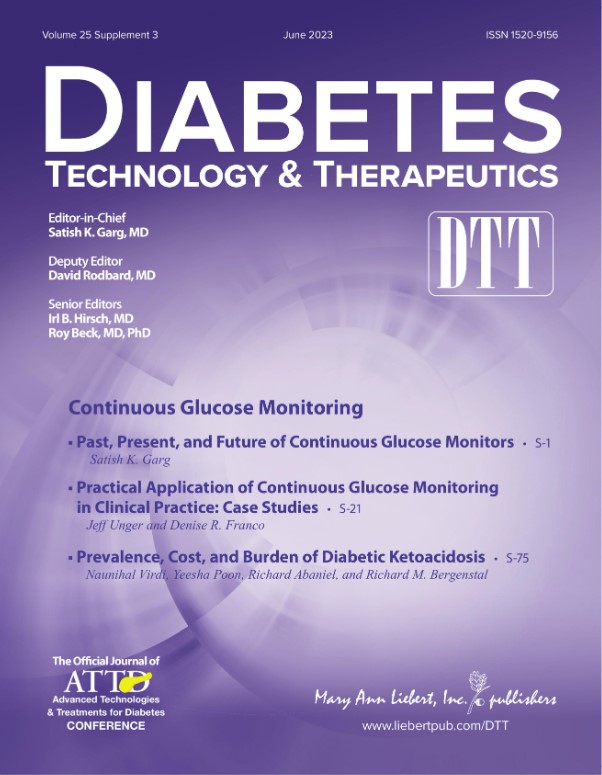Clinical Outcomes
In a real-word study analyzing 12 months of pre- and post-CGM-initiation US claims data, researchers found that CGM utilization was associated with lower hospital use and diabetes-related costs in intensive insulin-treated T2D. Among the 790 individuals who met the inclusion criteria, the number with ≥1 ED visit decreased by 30.0% (P=0.01) and with ≥1 inpatient visit decreased by 41.5% (P<0.0001). The number of diabetes-related visits and average number of visits per person likewise decreased by at least 31.4%. Total diabetes-related costs expressed as per-person-per-month (PPPM) also decreased by $341 PPPM. Managed care and payer professionals will find this analysis of interest in assessing the value of CGM as a cost-reduction intervention in the management of T2D among plan members.
Hannah KL, Nemlekar PM, Green CR, Norman GJ. Reduction in Diabetes-Related Hospitalizations and Medical Costs After Dexcom G6 Continuous Glucose Monitor Initiation in People with Type 2 Diabetes Using Intensive Insulin Therapy. Adv Ther. 2024 Apr 15. doi: 10.1007/s12325-024-02851-8. Epub ahead of print. PMID: 38619722.
Learn MoreA retrospective cohort study published in JAMA Network Open showed that CGM use was associated with lower odds of developing diabetic retinopathy (DR) and proliferative diabetic retinopathy (PDR). Among 550 adults with type 1 diabetes (T1D) included in the analysis, 62.7% patients used CGM, 58.2% used an insulin pump, and 47.5% used both. After adjusting for age, sex, race and ethnicity, diabetes duration, microvascular and macrovascular complications, insurance type, and mean HbA1c, CGM was associated with lower odds of DR (odds ratio [OR], 0.52; 95% CI, 0.32-0.84; P=0.008) and PDR (OR, 0.42; 95% CI, 0.23-0.75; P =0.004), compared with no CGM use. These findings show that CGM can be beneficial preventing DR—the leading cause of blindness among adults in the United States—even in individuals with well managed T1D.
Liu TYA, Shpigel J, Khan F, Smith K, Prichett L, Channa R, Kanbour S, Jones M, Abusamaan MS, Sidhaye A, Mathioudakis N, Wolf RM. Use of Diabetes Technologies and Retinopathy in Adults With Type 1 Diabetes. JAMA Netw Open. 2024 Mar 4;7(3):e240728.
Learn MoreThe ADA Standards of Care include all of of the organization’s current clinical practice recommendations and are intended to provide clinicians, patients, researchers, payers, and others stakeholders with best practices in diabetes management, general treatment goals, and tools to evaluate the quality of care. The recommendations are based on an extensive review of the clinical diabetes literature, supplemented with input from ADA staff and the medical community at large. These comprehensive guidelines are updated annually, or more frequently online if new evidence or regulatory changes merit immediate incorporation In alignment with previous versions of the ADA Standards of Care, the 2024 update highlights the clinical benefit of CGM across a wide range of patient types based on a growing body of evidence.
Learn MoreThis video resource highlights evidence—presented at the 83rd American Diabetes Association (ADA) Scientific Sessions—demonstrating the clinical, economic, and humanistic value of continuous glucose monitoring (CGM) in type 2 diabetes (T2D) for managed care and payer professionals. Abstracts presented in this video underscore the burden of hypoglycemia in T2D and the potential for CGM to improve clinical outcomes and manage disease-related costs regardless of treatment regimen or prescriber type. Key areas of focus pertinent to managed care and payer professionals include the benefits of CGM initiation on Healthcare Effectiveness Data and Information Set (HEDIS) measure performance, utilization of emergency department/hospital services, and patient adherence. This information is delivered in a multimedia infographic format, with quotes from managed care and payer key opinion leaders interspersed for maximum impact. The video concludes with a summary of best practices to facilitate streamlined coverage and access to CGM in alignment with the latest clinical evidence and expert recommendations.
This article reports key findings from recent randomized, observational, and retrospective studies investigating use of CGM in type 2 diabetes (T2D) individuals treated with basal insulin only and/or noninsulin therapies. Data from 29 studies were reviewed and analyzed. Both randomized and prospective/retrospective studies have demonstrated significant glycemic improvement, reductions in diabetes-related events and hospitalization rates, and cost benefits of persistent CGM use by individuals with T2D who are treated with basal insulin only, basal plus noninsulin medications, and noninsulin medications without insulin. In 23 (79%) of the 29 studies reviewed, investigators reported associations between CGM and improvements in HbA1c and/or key CGM metrics. These findings, alone, provide strong evidence that supports providing access to this technology to those with T2D who are less intensively treated. The narrative presents an evidence-based rationale for expanded access to CGM within the T2D basal insulin only and/or noninsulin treated population. Recent clinical guidelines from the American Diabetes Association and American Association of Clinical Endocrinology now endorse CGM use in individuals treated with nonintensive insulin regimens. Access in the basal insulin only population has expanded since the start of this project. CGM should be made readily available to all individuals with diabetes who are able to use this technology safely and effectively.
Learn More
Intended Audience: This activity is designed to meet the educational needs of medical directors, registered nurses, pharmacy directors, clinical pharmacists, specialty pharmacists, quality directors, as well as network physicians affiliated with various MCOs, health systems, and other payer organizations.
Credit Available: Up to 1.5 credit hours available for nurses (ANCC), pharmacists (ACPE), and physicians (AMA PRA Category 1 Credit™)
Expiration Date: October 31, 2024
Click Here to Review – CE EXPIREDEducational Objectives
After completing this activity, the participant should be better able to:
- Assess clinical evidence and professional society guidelines for CGM systems in patients with type 1 or type 2 diabetes
- Characterize the impact of rtCGM on clinical measures of diabetes care
- Implement medical and pharmacy benefit design strategies to support appropriate access to rtCGM and develop evidence-based clinical criteria
Expert Faculty

Matthew D. Harman, PharmD, MPH
VP, Clinical Solutions, Employers Health

Diana Isaacs, PharmD, BCPS, BCACP, BC-ADM, CDCES, FADCES, FCCP
Endocrine Clinical Pharmacy Specialist, Co-Director, Endocrine Disorders in Pregnancy
Cleveland Clinic Endocrinology & Metabolism Institute

Gary A. Puckrein, PhD
President and Chief Executive Officer, National Minority Quality Forum

Drake Reiter, PharmD
Advisor, Pharmacy Product & Trend, Priority Health
Jointly provided by Impact Education, LLC, and Medical Education Resources.
This activity is supported by an independent educational grant from Dexcom, Inc.

Prescribing of CGM in clinical practice and payer coverage criteria have expanded considering the wealth of evidence and expert recommendations supporting more widespread use. As the body of evidence continues to grow, a new supplement in Diabetes Technology & Therapeutics offers insights from leading clinicians on the latest findings and practical application of CGM. The supplement highlights real-world evidence and the unique role of CGM in the management of hypoglycemia and enhancing behavior modification among users of the technology. Special consideration is given to the economic impact of CGM and access issues that may be of particular interest to payer and managed care decision makers.
The articles included:
Past, Present, and Future of Continuous Glucose Monitors Satish K. Garg
Continuous Glucose Monitoring Impact and Implications of Real-World Evidence: Past, Present and Future James R. Gavin III and Clifford J. Bailey
What Role Might There Be for Continuous Glucose Monitoring in the Assessment of Diabetes Risk? Eden Miller, William H. Polonsky and Kevin Miller
Practical Application of Continuous Glucose Monitoring in Clinical Practice: Case Studies Jeff Unger and Denise R. Franco
Advancements in Diabetes Technology Are Outpacing the Evidence Michael Rickson, Eugene E. Wright Jr., Anila Bindal and Laith Ghonim
One Size Fits All Versus Individualized Medicine in Type 1 Diabetes Management L. Kurt Midyett
Is Continuous Glucose Monitoring a Tool, an Intervention, or Both? Eugene E. Wright Jr. and Savitha Subramanian
Continuous Glucose Monitoring Use in Older Adults for Optimal Diabetes Management Medha N. Munshi
Personalized Glycated Hemoglobin in Diabetes Management: Closing the Gap with Glucose Management Indicator Timothy C. Dunn, Yongjin Xu, Richard M. Bergenstal, Watru Ogawa and Ramzi A. Ajjan
Prevalence, Cost, and Burden of Diabetic Ketoacidosis Naunihal Virdi, Yeesha Poon, Richard Abaniel and Richard M. Bergenstal